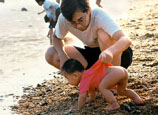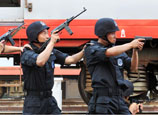
In Beijing, it is not uncommon for preteens to squeeze advanced math courses alongside computer programming, English, ancient Chinese literature, bridge, piano and golf into their after-school and weekend schedules.
Winter and summer holidays are often filled with intensive training, contests or certification tests that are widely expected to yield certificates or other credentials that may be an advantage in the child's next round of competition for a place at a high school.
These classes each cost around 10,000 yuan (US$1,629) a year on average. They are also considered care givers by working parents.
Wei's mother, Xie Jing, says she felt terrible when she was ill in bed. Her daughter dined out alone in a restaurant, "totally indifferent" to her ailing mother, she said.
"For the first time, I doubted my parenting skills. Maybe it was wrong to send her away to classes every weekend and not spend time with her myself."
Struggling in poverty
While urban children hustle to get to everything into their packed schedules, children in remote areas put their lives at risk by trekking to school across mountains and rivers.
Luo Tingxi, 13, is still a third-grader at a village-run primary school in the landlocked southwestern province of Guizhou. He is at least four years behind others, since Chinese children normally enter primary school at age 6 or 7.
Schooling was delayed partly because the trip to and from school is laborious and risky for young children. Luo leaves home at 5am and hikes for more than three hours on winding mountain roads. When he gets to school at 8:30am, he often collapses in his chair, unwilling to move.
By lunchtime, Luo struggles to stay awake. His parents give him 1 yuan a day for lunch, and he can only afford bread at the grocery near school. He has no water to drink since the school has none in the mountain area.
In the afternoon, he sleeps.
His teacher never scolds him for being late or sleeping. "It's a blessing they are safe. Many children cut school when it rains or snows," says Wei Yingzhong, headmaster of the Mazhai Primary School in Ziyun County.
According to Wei, at least 80 of the school's 226 students hike long distances to school from small villages. Village population is so scattered that there aren't enough children to justify opening new schools.
The school does not offer lodging for students.
Though China ensures nine years of compulsory education for all children, few students in faraway villages go on to high school at the end of the nine years, says Wei.
Poverty has caused a huge gap in these children's cognitive skills and communication with the outside world.
"What's an iPad? Is it edible?" asks 10-year-old Wei Haizheng in his ramshackle home in a remote village in Guangxi's Dahua County.
Eleven-year-old Fang Yuna says she wants to be rich. "I want to buy beautiful clothes," says the third-grader from a mountain village in Jinzhai County in Anhui Province.
Fang knows her future depends on whether she goes to the city in search of work, like her migrant parents who only see her once a year and leave her and her brothers in the care of grandparents.
Fang is smart and teachers say she should go to college. "But she longs for money and city life. I doubt if she will finish junior high," says a teacher.
Earning a living in cities tops the wish list of many primary school students in the remote villages of Guangxi.
According to Zhang Fayun, an official in rural Ziyun County, only 40 percent of junior high school graduates go on to senior high. Nearly 20,000 students finished junior high school last summer, but only 3,223 attended high school, Zhang says.
Almost all the others had migrated to cities in search of work. "The students worry about their families' financial burden. Some families live on less than 2,000 yuan a year," says Zhang. "The students also know it's getting difficult even for college graduates to secure a job, so they'd rather earn a living at a younger age."


















 Sweating at Yoga club: white collars' new choice after work
Sweating at Yoga club: white collars' new choice after work


![]()
